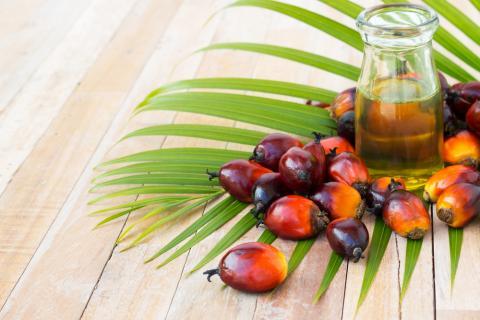
Have you looked at the ingredients in an Oreo lately? Sure, it's loaded with unhealthy sugars and fats, but your eyes probably skimmed over one important ingredient: Palm oil. Oreos use palm oil, along with many other snack brands most kids (and adults) love to eat. Why is this a big deal? I'm glad you asked.
Meet conflict palm oil, the orangutan killer
There's a dark truth behind palm oil, and it's far from pretty. Palm oil production is so high in demand that it leads to deforestation. This sort of palm oil is called conflict palm oil, because it conflicts with environmental and humanitarian issues (more on that later). In order to meet demand needs, conflict palm oil industries tear down rainforests and replace them with palm oil farms. You want to know how they 'tear down' the forests? By burning them. Yes, you heard that right. This causes massive carbon emissions and has pushed species such as the Sumatran orangutan to the brink of the extinction. Considering Sumatra and Borneo are the only places to find orangutans (in the wild), this is a huge deal. There are approximately 42,000 orangutans left in the wild and only 6,000 orangutans left in Sumatra. Compare that to 100 years ago when there were approximately 500,000 orangutans in the world. It's safe to say the orangutan is a critically endangered species now, all thanks to human activity. Sad, right?
The dynamics of growing palm oil
Thing is, the palm oil plants can only be grown in tropical locations, and they need a lot of water. They were originally native to only South America and West Africa, but now conflict palm oil plantations have spread throughout the wet tropics to Papua New Guinea, parts of Asia, and Kenya. That said, the two most affected countries in this expansion are Indonesia and Malaysia, home of the imperiled orangutans. That's because conflict palm oil is such a huge industry.
In order to save a buck, conflict palm oil companies prefer to clear primary forests, not degraded areas or grasslands. This is because they don't need to utilize or add as much chemical fertilizer (which is expensive) to forest land cleared by fire – instead, the ash produced from the fire actually works as a natural fertilizer for the plantation. Not to mention the cost of clearing peat swamp forests is subsidized by the sale of commercially valuable timber, taken from concession areas as part of the conversion process. To make matters worse, after palm oil plantations are established, displaced and starving orangutans are frequently (and brutally) killed because they are seen as agricultural pests when they try to obtain food in the plantation areas. Is that sickening or what? The irony in all this is that the orangutans were there first, so who's the real pest?
Why conflict palm oil exists: Money
There's no way to put this lightly: Conflict palm oil destroys orangutan homes and messes up biodiversity. Not to mention the conflict palm oil industry also violates human rights through the removal of indigenous people from their homes and use of child labor. How can something so cruel and harmful be allowed? One simple reason: Money. Big name brands want cheap palm oil to meet supply and demand. They're thinking in the moment, thinking about sales. They fail to observe that forests produce much of the oxygen we breathe and even influence weather patterns globally. Trees absorb CO2 from our atmosphere and give us back oxygen. Without them, we wouldn't be able to breathe. But sadly, big name brands that are dead set on making a buck would rather kill our lungs than confess this truth.
What you can do: Help ban conflict palm oil
So, what can you do? Avoid conflict palm oil. Make a statement with your dollar and stop investing in companies and brands that support these kinds of production practices. That's easier said than done, considering conflict palm oil can be found in almost everything: icing, cookies, ice cream, biscuits, etc. It's even used in beauty products (I know, crazy, right?).
The best advice I can offer you is to look for palm oil on ingredient labels. I can guarantee you, most big snack brands (PepsiCo being the biggest user of conflict palm oil) will have it in their products. Stop buying these products, no matter how much you love them. Try making some healthy snacks at home instead, or learn how to banish sugar cravings completely. Whatever the case, refuse to use anything containing conflict palm oil. Better yet, reach out to the brands that you see support the use of conflict palm oil and tell them you're against it. You can find their contact information online, reach out to them on their social media platforms, email them, or even call them up. Letting these brands know how you feel is huge: As the consumer, you have the power to choose where your money goes. If everyone decides to stop buying products with palm oil in them, think about the sort of message that would send to these corporate giants.
The truth is, palm oil can be made sustainably. If you can't completely avoid palm oil, look for Roundtable on Sustainable Palm Oil (RSPO) certification. Similar to the USDA organic seal, it can be found on products that use sustainably sourced palm oil. Unfortunately, there's only a small number of products that are RSPO certified, but it is an increasing number (which is great). To find out which products are RSPO certified, be sure to visit their website. If you cannot get your hands on these products, no worries: Just avoid anything with palm oil in it until more brands become RSPO certified. One healthy and environmentally sound alternative to palm oil is coconut oil, but for those that cannot stand this oil (or are allergic to it), here are a few others.
If you want to get even more involved, please consider donating to nonprofit organizations that are dedicated to helping rainforests and orangutans. Orangutan Foundation International is a great place to start, and they offer many things such as free resources (like educational kits) and eco-trips (where you can literally go and see wild orangutans yourself). You can also make a donation, volunteer, or become a member with them. Either way, your kindness will help ensure these magnificent creatures are around for years to come.
All in all, conflict palm oil needs to be banned. With your help, we can make it happen. Make sure to spread the word to your friends and family, so they know how bad conflict palm oil really is. Better yet, share this article with them! The more people who know, the bigger the army we have to fight it.








